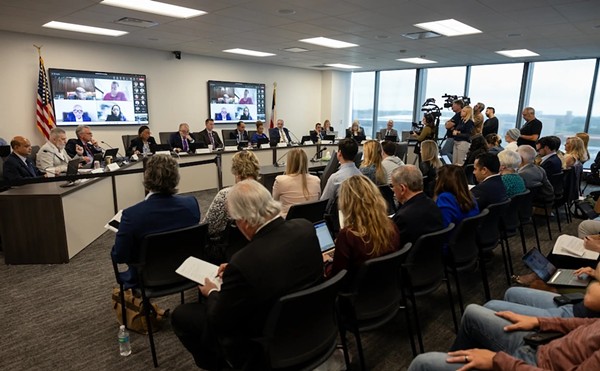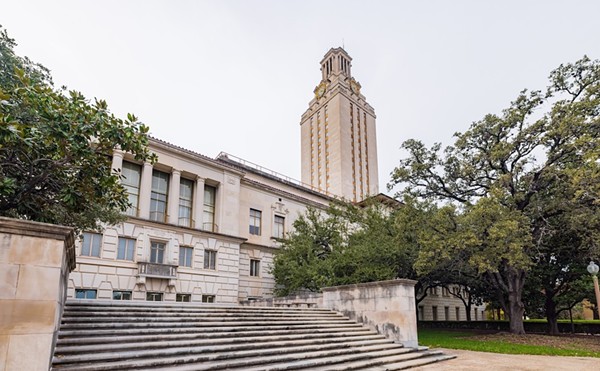On July 18, the Electric Reliability Council of Texas issued an email message that would have stirred consumer anxiety throughout the
state - if only consumers had known about it.
The email, sent to utility regulators, industry providers, and, inadvertently, to a few media outlets, stated that ERCOT projected a "higher than usual risk" of shortfalls in reserve electrical capacity that day, and warned that "emergency actions may be required," including a rolling blackout designed to prevent a region-wide power outage. Within hours of the email's release, ERCOT tried to defuse any sense of alarm they might have caused, insisting that it has merely been "over-communicating" with its contacts in recent months about even the most routine requests for increased power generation: "It sounds ominous, but it does not mean we are going into an emergency condition."
According to Ken Donohoo, transmission-services system manager for ERCOT, Texas has long faced periodic dangers of electrical shortages.
"This is part of our normal job," Donohoo says. "The possibility of reserve shortfalls is nothing new, we're just trying to communicate more. This used to happen all the time in the past, but people wouldn't know about it."
If there's a consistent complaint about the way ERCOT operates the state's power grid, it's how little information anyone outside its offices has about it. That's closely followed by concerns over how little power anyone has to regulate it. Much of the frustration centers around the peculiar way that ERCOT floats between public and private sectors, seemingly skirting the oversight that either kind of entity would face.
"They serve a very public function to make sure that everything is sound with the electrical grid and to prevent blackouts," says Tim Morstad, utility specialist for the Office of Public Utility Counsel. "But they're not a public agency."
ERCOT's role as a manager of the state's electrical power has increased dramatically in the four-and-a-half years since Texas deregulated the industry. As Morstad points out, consumers' electricity bills include an ERCOT fee that functions like a private-sector tax. Although the Public Utilities Commission controls ERCOT's purse strings, it plays a limited role in reviewing ERCOT's policy decisions. As a result, when a crisis occurs, such as the rolling blackouts across the state on April 17, anger is widespread, but no one is sure where to direct that anger.
"When we had the blackouts, the PUC was upset and the legislature got mad because they heard from their constituents about it," Morstad says. "`ERCOT` is making some important decisions. Who's making them? Who's observing how they're spending their money?
"Since there's no competition for ERCOT, they're operating like a monopoly. So, in that way, they look more like a state agency than a true private business. And it raises questions: Should their executives be paid in line with private or public standards? These are the kinds of things that aren't being answered."
ERCOT has blamed the rolling blackouts of April 17 on high temperatures that created demand levels no one could have anticipated. "For one thing, the 100-degree heat was a total anomaly, and the number of units that were all out of commission at the same time was also very unusual," Donohoo says.
While Morstad is careful not to bash ERCOT for its handling of the rolling blackouts, he does say that the company's projections for consumer demand that day were insufficient because they did not take into account the possibility of anomalous weather conditions, which are anything but an anomaly in Texas.
A federal study determined that state electricity prices rose by 23 percent over the last year, and Morstad says that consumers who've stayed with their pre-deregulation providers have seen rate increases between 80 and 100 percent since 2002.
"Deregulation of the electric industry has been an absolute mess, and as a result there's really no one in control of the power grid except the inmates, or the power companies," says Tom "Smitty" Smith, director of the Texas office of Public Citizen, the Ralph Nader-founded watchdog organization. "The questions about whether or not we're going to have electricity shortfalls really revolve around whether companies can gain the market and pull their power or fail to provide adequate generation at times when we need it.
"There's plenty of electricity to meet our needs. There is a significant number of mothballed electrical units that could be brought on. The talk of shortfall is generally designed to convince Texans they need to sacrifice their air quality to build another generation of coal plants."
ERCOT's credibility has also been damaged in recent years by a scandal involving six company employees indicted on charges of financial corruption. Five of the employees have been convicted and sentenced, with one still awaiting trial. "I think it was just a few individuals who were engaged in criminal activities," Smith says. "I think there are some systemic problems, however, with the way the ERCOT market functions. The ERCOT market is still highly prone to gaming by companies that want to profit from imbalances or insufficiencies in the market."
Ultimately, most criticisms of ERCOT are as speculative as the company's projections about the threat of future blackouts. With so little effective oversight of the company's operations and policy decisions, consumer advocates complain that they're left in the dark.
"ERCOT needs to be brought more firmly under the control of the legislature and the PUC," Smith says. "We need to do a much more thorough evaluation of all our alternatives. Energy efficiency and renewable energy are far less expensive ways to generate power without pollution. And we need to be using them."
Tags:

KEEP SA CURRENT!
Since 1986, the SA Current has served as the free, independent voice of San Antonio, and we want to keep it that way.
Becoming an SA Current Supporter for as little as $5 a month allows us to continue offering readers access to our coverage of local news, food, nightlife, events, and culture with no paywalls.
Scroll to read more San Antonio News articles
Newsletters
Join SA Current Newsletters
Subscribe now to get the latest news delivered right to your inbox.

















